Peter MALONE
Saturday, 09 October 2021 13:00
Angel Has Fallen
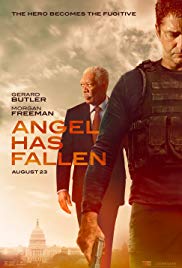
ANGEL HAS FALLEN
US, 2019, 121 minutes, Colour.
Gerard Butler, Morgan Freeman, Danny Huston, Jada Pinkett-Smith?, Tim Blake Nelson, Piper Perabo, Lance Riddick,
Directed by Rick Roman Waugh.
The title sounds like Lucifer defying God in heaven – but the screenplay says that Secret Service Agents have the role of guardian angels to their charges.
With Olympus Has Fallen and, then, in London Has Fallen, fans know that Gerard Butler is the guardian Angel for the American President himself. So, the title indicates that something is amiss for Butler’s Mike Banning. In fact, he is the target of the most elaborate frame up, pinning an assassination attempt on the President allegedly by him, backed by Russia to the tune of at least $10 million!
But, who can rescue Mike Banning when he is in danger? Of course, the answer has to be, Mike Banning himself. And so he does.
The question is, who are the villains? But, moviegoers have become very quick at spotting the villain and, in this case, you certainly don’t have to be Sherlock Holmes, let alone a first-year rookie at Detective School, spotting the villains almost as soon as they appear. Which means, that we can be self-congratulatory as we share the action, tensions, traps, fights with Banning.
Gerard Butler looks to be getting a bit older and heavier, and his character is suffering from migraines, taking multiple tablets, visits to various doctors whose advice he ignores. But, in the event, arrested, escaping, driving a huge truck pursued by the police cars, infiltrating the hospital, masterminding the defence of the President and, finally, mano a mano with the villain, we share the drama with him.
There is a strong and varied cast, Morgan Freeman always dignified, with great gravitas, speaking beautifully, is the president. Danny Huston is a colleague of Mike Banning from the past. Jada Pinkett Smith is a tough FBI agent. Tim Blake Nelson, often in comedies, is a bespectacled VP. The film is directed by talented stuntman, Rick Roman Waugh.
What we see is conspiracy on a vast scale, political turmoil in Washington, arguments for a war against Russia, a vast militia supported by big business interests, and the framing of Mike Banning as an arch-villain. The clues against him are so well placed that the FBI and the media take it for granted that he is guilty.
But, he has another, unanticipated ally. After engineering his escape from the pursuing police, he goes into a forest wilderness, finding a hut and – of all people – his long-departed Vietnam veteran father, living alone in protest against the government like the Unabomber. And, he is played by Nick Nolte which gives further edge to the portrayal and to the restoring of father-son relationships (via a huge range of explosives protecting his refuge).
From then on, plenty of action, an attempt by the conspirators to blow up the hospital with the president, but Mike Banning overcoming his mental stress, the emotional stress, drawing on his loyalty, and his years of Secret Service experience to save the day. Angel Arises – ready for any further sequel! (Fans wouldn’t be sorry.)
And Gerard Butler should have been Jack Reacher!!
1. The action series with Mike Banning? Secret Service? His achievements in the past? His being framed? Audience expectations?
2. The title, the Secret Service as guardian angels, Mike Banning as the President’s guardian angel?
3. Washington DC, the exercise at the training centre, the fishing lake, the forest? Hospital sequences? The roads, car chases, the remote hut, the series of explosions? Action and special effects? The musical score?
4. Mike Banning, the harshness of the original exercise, the guns, Secret Service action? Wade Jennings, owning the company? The past bond with Mike? The visit to the home, the meal? Audiences spotting the villain?
5. Morgan Freeman as the president, his dignity, manner, speaking voice and gravitas? The VP, at the meetings, his look, spotting the vice president as villain?
6. The president at the Lake, the fishing, the attack of the drones, the visual and found impact of the drones then numbers, the range of deaths? Mike and his rescuing the president? In hospital?
7. His being framed, the plot and details, the evidence, the money from Russia? His arrest, in the vehicle, his escape?
8. The president, in coma? The cabinet meetings, the leaking of information, the vice president, his being sworn in, his manner in office, the political issues, the Russian connection, memories of the hacking and the presidential election, the payment for the assassination attempt? His wanting to go to war, the issue of private contractors and their making money? The distorted voice on the phone to Jennings?
9. The FBI, agent Thompson, her assistant, strong, the interrogations, of Mike, the accusations, going to leave? The arrest? The continued pursuit, assessing the evidence, baffled, the change of mind? The investigations into Salient, the call, going by helicopter to confront Jennings, his killing the agents?
10. Leah, the baby, love for her husband, Mike and his going to visit the different doctors, migraines and tablets? Not telling Leah? The offer of the directorship? The discussions with Wade, the past bonding? The arrest, Leah’s response, the police and the reporters? His phone call?
11. The pursuit by Jennings, the alleged rescue, the fight, Mike’s escape, the service station, the phone call, the FBI and the locations? The police pursuit, the locals and their militia? Mike taking the truck, the chase, the crash?
12. The hut, the introduction to Clay, his story, Vietnam and achievement, disillusionment, leaving his family, hiding like the Una-bomber? Talking with his son? Helping, his property ringed with explosives? The escape, the vehicles?
13. Jennings, the link with the vice president, the plan? The president waking? The vice president pushing for action against Russia? Jennings and the decision that the president had to die?
14. The hospital sequences, Mike and his infiltration, arrest, going to the President, being freed, the role of David as the President’s assistant? The various members of the Secret Service? Their jobs?
15. Jennings and his plan, to destroy the hospital, the computer experts, the gas in the basement? The setup?
16. The hospital evacuation, hiding the President, the bluff?
17. The climax, the shootouts, the two men fighting, the knives, Jennings and glad that it was Mike who killed him?
18. The president confronting the vice president, the moment of bluffing him, the arrest?
19. Mike with the president, promising to tell the truth, accepting the job?
20. The final family sequences, Clay and his bonding with the family, Leah welcoming him? And the joke during the final credits but their both doing the New Age Therapy in the baths?
Published in Movie Reviews
Published in
Movie Reviews
Saturday, 09 October 2021 13:00
Overcomer
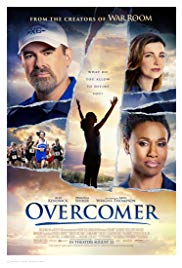
OVERCOMER
US, 2019, 121 minutes, Colour.
Alex Kendrick, Shari Rigby, Aryn Wright Thompson, Priscilla C.Shirer, Cameron Arnett, Jack Sterner, Denise Armstrong.
Directed by Alex Kendrick.
“We shall Overcome� has become something of an anthem. And, when it is founded on faith and commitment, the title ‘Overcomer’ has initial spiritual vigour about it.
For over a decade, the Kendrick brothers, based in Georgia, have been making faith-based films which have been extraordinarily successful in the United States, generally appearing on the top box-office list the week that the film opens – which is, in fact, the case for Overcomer which came in at third with over $8 million in receipts. Obviously, the Kendrick brothers touch the faith-nerve in their target audience (this can be vividly seen in enthusiastic blog responses to the film in the IMDb – “at last a film I can see with my mother�).
Alex Kendrick is cowriter, director and the star of the film. He is a genial screen presence, the average American able to identify him, age, appearance, manner of speaking, family man. He has a sympathetic wife and two fine children.
Another feature of the Kendrick films is an interest in sport and physical activity. Overcome begins with a basketball game but, unpredictably, moves into the sport of cross-country running. The Harrison family lived in the city of Franklin, a city in some decline, industry moving out, populations moving out. John Harrison, basketball coach at the Christian high school, is losing members of his crack team and the principal asks him to take on cross-country running. There is only one taker, a 15-year-old girl, Hannah Scott (Aryn Wright Thompson), her parents dead of drug incidents, living with her stern grandmother. She has a bit of a stealing problem.
Another feature of the recent Kendrick films is that they are less church-oriented and more focused on individual faith, private prayer, reflection on commitment to Jesus as saviour. This is very strong with the case here, not only for John Harrison who has to reassess his life but also for Hannah, the school principal taking her through chapter 1 of the Letter to the Ephesians, and Hannah learning the love of God as well as forgiveness.
And this is necessary because one of the other central characters is a former runner, Thomas Hill (Cameron Arnett in a very sympathetic performance) who is hospitalised with diabetes and is blind. And, he has re-discovered God.
There is humour in the screenplay. There is a great deal of sentiment in the screenplay – especially in what seems to be coincidence but might be called divine Providence. Which means that the film is satisfying entertainment for the target audience, a sincere focus on faith and prayer, characters that can be identified with, sports interest and competition (and, no real spoiler, victory), tensions leading to forgiveness and reconciliation. Obviously, a gospel parable.
And this is to warn that this is definitely not a film for atheists and, especially, those who think that there should be no sentiment, let alone sentimentality, in the movies, can be warned off!
During the final credits there are lots of mentions of the name Kendrick, which means that the whole family is involved in good-deed moviemaking.
1. A popular faith-based film? American Christian denominations? Christian stories? Faith and prayer? Reaching the target audience?
2. The Georgia settings, the city of Franklin, school, sports arenas, homes, hospitals, the woods and cross-country racing?
3. The musical score, sacred background, hymns?
4. Audiences identifying with the characters and situations? Middle-class Americans? Small towns, families, faith dimensions, mixture of African Americans and whites?
5. The introduction to John Harrison, the basketball match, his son losing, weeping, John as coach, support? His relationship with Amy, his boys? His hopes for his work as a coach?
6. Industry in cities, changing, factories closing, transferring, populations moving? The school, smaller numbers, the role of the coaches, the work of the principal, the suggestion of cross-country racing? John’s reluctance? The introduction to Hannah, seeing her stealing and being chased? Living with her grandmother? The death of her parents? Her running, the only candidate for the course, her asthma? The principal paying for her tuition?
7. John, with the pastor, the hospital visitations, the chance visit to Thomas, Providence in John’s life? Thomas blind, his diabetes, his conversion, his past life, his prayer? The background of his running and his expertise? John visiting again, not having prayed for Thomas, Thomas asking who are you, what are you? John having to rethink his life and priorities? Going home, upset about school, clashing with his wife, the bricks, apology, their love for each other, the sons observing?
8. Thomas and his daughter? Hannah and her story? Connecting the two stories? The dilemma about informing Hannah? The discussions with the principal? Hannah choosing to visit, the awkwardness of the first visit, her wanting to visit again? Not telling her grandmother? Grandmother upset? The grandmother visiting John and Amy and being stern?
9. The principal, strong character, dealing with John, supportive of Hannah and paying her these, present at the races – and the strong sequence where she urges Hannah to study chapter 1 of the Letter to the Ephesians and Hannah makes her list of how God sees her in terms of this chapter?
10. The grandmother, her character, working hard, the suffering of the death of her daughter, hating Thomas, the lie to Hannah, discovering what it happened? Rebuking John and Amy, visiting Thomas in hospital? Going home, her prayer?
11. The scenes of training, the range of students in cross-country? John’s son and his interest, going for the run, winded? Building up some fans for Hannah? Hannah, the gradual improvement, her interest in racing?
12. The issue of the earpiece, the coaches and their vote? John using it, the boys setting the times for the race? The discussion with Thomas, recording his coaching advice?
13. The race itself, Hannah listening, coming to the end, her collapse? The time, the video, her winning? Her visiting Thomas, putting the medal round his neck?
14. The grief at the funeral? The reconciliation after the grandmother watched the race?
15. The postscript, Hannah and her future, her achievement?
16. The Christian dimensions, the God language, the faith language, the Providence or coincidence of Hannah’s story and meeting Thomas, testimony to Jesus in faith, sentiment and feeling?
Published in Movie Reviews
Published in
Movie Reviews
Saturday, 09 October 2021 13:00
Playoff
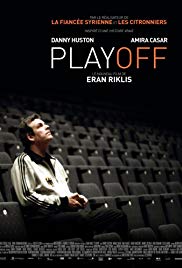
PLAYOFF
Israel/ Germany, 2011, 107 minutes, Colour.
Danny Huston, Amira Casar, Mark Waschke, Max Riemelt, Selen Savas.
Directed by Eran Riklis.
This seems like a film about basketball – and, in many ways, it is – it is far more a portrait of its central character as well an exploration of German memories of the Holocaust in World War II and of the effect on Germans who made their escape to Israel.
The film offers a fine performance by Danny Huston who won the best actor award at the Montréal Film Festival in 2011. In many ways it is a brooding performance. It portrays a successful basketball coach in Israel who is employed by the Germans in preparation for the Olympics of 1984. We see the German officials, wondering whether they had made the right decision, thinking of the political implications, the German memories of the war, the media latching onto an Israeli coach and questioning him as to his motivation for coming to Germany, even to achieve some kind of revenge.
While there are basketball sequences, and especially of the coaching and training, there is much more to the film. And, it is noted that the end, the Germany ranked eighth at the 1984 Olympics.
The coach revisits the areas of the city where he grew up, venturing in to look at the apartment, encountering the Turkish wife and daughter who live there, becoming part of their lives, his offer to hire a private detective to discover the husband who had abandoned them. This has a profound effect on the wife and, eventually, on the daughter. It also brings out the humanity in the coach, especially since he is considered a traitor in Israel, his mother and his wife and family not answering his phone calls.
They provide the opportunity for him to come to terms with himself, discover more of the truth about his childhood life, his blaming himself for his father’s death, the episode of stealing a cake and his father’s shame. As it turns out, the actual events were quite different from what he thought. And, with his father problems, he also has to confront the young man who is the captain of the basketball team, his soldier father committed suicide and who bears greater anger and resentment.
Sports fans will be surprised at how much deeper and significant the humane themes are.
The film was directed by the fine Israeli Dir, Eran Riklis (The Human Resources Manager, Shelter and, especially, The Lemon Tree).
1. A film from an Israeli director? With a German story? Memories of the 1940s? The Holocaust and escapes to Israel? The heritage for Germany? Questions remaining in the 1980s?
2. The German settings, the period, the city, the streets, the river, apartments, cake shops, atmosphere? Evoking memories of the 1940s? The musical score?
3. A basketball film? The story of the German team, preparing for the 1984 Olympics (and their coming eighth)? The hiring of the Israeli coach? The response of the team and hesitations? Of the captain and his animosity? Of the officials and their taking a risk? Of the media and their asking questions about the past, the coache’s possibility for revenge for the past?
4. Danny Huston as Max Stoller, screen presence, age, background in Israel, successful coaching? His being employed, his relationship with the officials, discussions, their challenges, the older official and his Nazi past? His motivation for going to Germany, to the city where he lived as a boy? Reviving memories, anxieties? The ironies of the final revelation about his mother and father?
5. The basketball, the team, the personalities of the members, Thomas and his leadership, his animosity, his memories of his father, soldier in the war, suicide? His anger, on the court? Defying Max? The discussions, Max not praising him, sending him off, dismissing him? Going to visit him in his home? Challenging him? Thomas’ challenges to Max? His finally playing?
6. Max, the phone calls to his family in Israel, his mother not answering, his wife not answering, the media calling him a traitor?
7. Max and his being interviewed by the television, the girl passing in the street, her insolence? His later return, going to the apartment where he grew up? Deniz and her story, her husband disappearing from Turkey, her coming to Germany with her daughter? Her cleaning toilets in hotels? Max and his meeting her, the discussions, the news about her husband, his decision to help, the hiring of a private detective to find the husband? The discussions, people priming through the windows, the graffiti on her door, the accusations? The bond between them? The outing in the countryside? The discovering her husband but do not saying? Her offering herself to Max, his refusal? The visit to the cake shop, her dismay? The revelation that her husband had married a German and they had a baby? Her life, her daughter’s life? The gift of the watch?
8. The officials, the risk in hiring an Israeli, the atmosphere of the times, working with Max, his irritability, letting his private concerns impinge on his work?
9. Max, the gradual revelation about his past, the stealing of the cake, the lady of the cake shop and her recognising him, the discussions? The revelation that she did not tell the father, that he paid for the cake? The fact that he was still alive? His wife betraying him, the escape to Israel? His silence, living all the years? Max and the discovery of the truth about his family, the shock? After helping Deniz with her husband, Thomas with his
father?
10. The portrait of a German Jew, the Holocaust, escapes, migrants to Israel and their treatment, growing up, the memories of the past, blaming himself for his father’s death? Returning to Germany, the search for the past? His discoveries?
Published in Movie Reviews
Published in
Movie Reviews
Saturday, 09 October 2021 13:00
Escape, The/ 2017
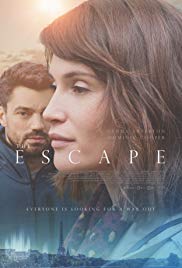
THE ESCAPE
UK, 2017, 101 minutes, Colour.
Gemma Arterton, Dominic Cooper, Frances Barber, Marthe Keller.
Directed by Dominic Savage.
The escape in the title is not what audiences might have imagined, yet the images of escape, especially from prisons, is apt.
This is a brief portrait of a husband and wife in their 30s. The wife is played with great sensitivity by Gemma Arterton, the husband, an ordinary and rather unimaginative man, by Dominic Cooper, playing well against type. Also in the cast in a crucial role is veteran Swiss actress, Marthe Keller.
The film spends some time with the wife, inviting the audience to empathise with her, try to understand her and her increasing depression. She is at home, doing the ordinary things at home and with the children, the boy having tantrums. There are the routines, the sexual demands of her husband, his not really appreciating what is going on, especially when she visits London for a change, buys a book on tapestries and wants to do an art course, something which he can’t quite understand.
Eventually, everything gets too much for her, asking advice from her mother, but walking out and taking a trip to Paris where a photographer flirts with her and she has a momentary affair, collapses but is helped by an older woman, Marthe Keller, who listens to her but gives her advice, acknowledging she must change her life but, if possible, with her husband.
This is a film which many wives could well identify with, a film which challenges unimaginative husbands.
1. Expectations from the title? A different kind of escape than anticipated?
2. The British settings, the town, the visits to London, home, school, the light of the London outside market? The visit to Paris, the sites, the atmosphere? The musical score?
3. A portrait of Tara, her age, relationship with her husband, with her children? Unfulfilled ambitions? Her depression and its consequences? In herself, withdrawn, in relationship to Mark, the sexual relationship? Withdrawing from him? The tantrums of the boy? The effect of the visit to London, wanting to do the art course, the fascination of the tapestries book? Mark and his reaction? Everything becoming too much for her? Walking out, buying a ticket to Paris, wandering, the encounter with the photographer, the affair with him, his being married, the effect on her, breaking the relationship? The effect of Paris, the different atmosphere, the art, tapestries? Upset in the street, taken in by Anna, confiding in Anna, and her wise words? Urging her to change her life, but, if possible, with her husband? Her return? The possibilities for the future?
4. Mark, very ordinary, going to work, the pressures of life, earning money? His relationship with Tara, love for her, not understanding her, his growing concern, outbursts of anger? His ability with the children, calming them, the boy polishing the car…? The effect of Tara leaving, his bewilderment, the messy house and how he would cope? Her return?
5. The going to see her mother, strong words, the lack of communication, her mother not looking after the children?
6. The encounter with the photographer, his flirting, the photos, the conversations, her making up a story, the night together? The effect on her?
7. Anna, the older woman, her kindness, listening, talking, the advice?
8. Married couples, crises, ability and inability to cope?
Published in Movie Reviews
Published in
Movie Reviews
Saturday, 09 October 2021 13:00
They'll Love Me When I'm Dead
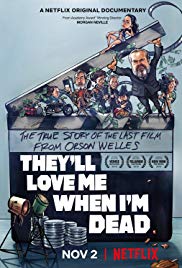
THEY’LL LOVE ME WHEN I’M DEAD
2018, 98 minutes, Colour/black-and-white.
Orson Welles, Oja Kodar, Peter Bogdanovich.
Directed by Morgan Neville.
This is a documentary on the making of Orson Welles unfinished drama, The Other Side of the Wind. It is a must-see film before watching the completed work after its release in 2018.
Some of those involved in the original film, actor Peter Bogdanovich, producer Frank Marshall, were able to work on the editing of Orson Welles’ vast amount of material to produce a two hour film.
The film is narrated, sometimes straightforwardly, sometimes coyly, by Alan Cumming.
This is a cinema essay, a historical exploration, a portrait of the eccentric director. The impact of the film will depend on audience interest in Orson Welles and the making of this film and their knowledge of his career.
The makers have created a narrative, with the use of footage of Welles on set, on television interviews, personal material and have combined it with clips from his films and photos. There is a range of talking heads and interviews but also having Welles himself reply and comment by picking out special moments from his own films like Touch of Evil, The Trial and his Shakespearean films. There is a mixture of black-and-white footage as well as colour, as there is in the completed film.
This is an opportunity to make an assessment of Orson Welles as an artist, as an eccentric personality, literally larger than life. Some of the material is expected, some not, especially his humour on talk shows and the scene with the Muppets. There are more twinkles in his eye than might have been expected.
The film goes back to his achievement in Citizen Kane, his making of The Magnificent Ambersons and the studios disappointed with it, continually cutting it, his being away in Brazil to make a documentary and his not returning when urged to intervene for the film. His virtuosity is seen in scenes from Lady from Shanghai, scenes from his Shakespearean films, Othello, Chimes at Midnight, the Don Quixote film.
There are reminders that he took on acting jobs in order to finance his films, a glimpse from Genghis Khan – but not from his powerful Cardinal Wolsey in A Man for All Seasons. There are quite a number of interviews with talk celebrities as well as a speech at his lifetime award, an opportunity for spruiking his film and getting finance.
But, most of this documentary is about the making of his film, extraordinary number of years that he worked on it, the range of people that he relied on. There is a lot on the choice of John Huston as the director and many of his scenes. The curiosity item is the response to Rich Little and his impersonations and the invitation for him to take a central role, his performance, falling out with Welles, disappearing. Because Peter Bogdanovich had been present, interviewing Welles, beginning his own career as a director, he then took on the role after Little left the project (and derogatory remarks on television with Burt Reynolds about Bogdanovich). Some scenes have a lot of directors and actors, and some interviews with some of them like Dennis Hopper.
There is the filming of many of the scenes and their performances – which means that when they appear in the film itself they make sense and make quite some impact. There are actors, the request to improvise, the actress with whom Welles was living, the waitress who brought the meals and was incorporated into the action.
The question is whether Welles was a perfectionist, or just bombastic, not finishing projects, not dealing well with producers and financiers, being swindled, difficulties with the Shah and Iran at the time of the revolution, and difficulties with copyright and ownership which was important in terms of French law and the impounding of the film.
Peter Bogdanovich and others were responsible for the final completion of the film and its release in 2018. It reached a wider public when it was taken up by Netflix.
Published in Movie Reviews
Published in
Movie Reviews
Saturday, 09 October 2021 13:00
Naked/ US 2018
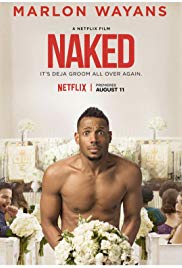
NAKED
US, 2017, 96 minutes, Colour.
Marlon Wayans, Regina Hall, Dennis Haysbert, J.T.Jackson, Scott Foley, Eliza Coupe, Brian Mc Knight, Loretta Devine.
Directed by Michael Tiddes.
Marlon Wayans does spend an amount of this film naked but that is part of the joke rather than anything lewd.
The film is based on a Swedish comedy, Naked, 2012. And, as audiences will quickly realise there is a great deal of the influence of Groundhog Day which was also used as a basis for the horror film, Happy Death Day).
Wayans portrays a sympathetic time teacher of English literature at a prep school, Rob, but has not made final decisions for his life. His fiancee is a well-qualified doctor, Regina Hall. Her father, a very successful businessman, has no time at all for Rob and wants to sabotage the wedding. In the background are the fiancee’s former boyfriend, Scott Foley, who is unmasked as trying to get vengeance on her father by undermining and taking over his business as well as Eliza Coupe as a very jealous former date who concocts a scheme to humiliate Rob but is exposed.
Rob’s friend takes him out the night before and he wakes naked in another hotel, trapped in an elevator, making way his way through a crowd, difficulties in the street, trying to get some kind of cover, running in a marathon. There are numerous returns to his original day, becoming more familiar with the characters that he meets, finding strategies to overcome the difficulties of getting to the wedding, making phone calls, getting some clothes, involved with two friendly police, some bikies, gradually building up a scenario where he gets to the wedding, his father-in-law rejects him, his fiancee puzzled, also the priest. Further complications include getting the reprinted programs, overhearing marriage vows texts, getting some ideas and failing.
Eventually, Rob has to come to terms with himself, make a decision about his future job teaching, get to the church on time; he is able to talk to his father-in-law and expose the takeover, the father-in-law melting and giving his daughter her mother’s wedding ring for the ceremony. And, the vicious ex-girlfriend is exposed and arrested.
Which means that the film can end with the first dance, Rob becoming expert at tango, a whole range of people from the groundhog days turning up for the celebration.
One of the better comedies from Marlon Wayans, some silliness as usual, but, he is more engaging and the film capitalises on the groundhog day conventions.
Published in Movie Reviews
Published in
Movie Reviews
Saturday, 09 October 2021 13:00
Sarajevo

SARAJEVO
Austria/ Czech Republic, 2014, 97 minutes, Colour.
Florian Teichmeister, Malika Foroutan, Heino Ferch.
Directed by Kurt Mundl, Andreas Prochaska.
This is an Austrian film, filmed in the Czech Republic with a Czech cast, but a Bosnian Serb story, taking the audience back to a re-creation of those fatal days in August 1914 in the city of Sarajevo.
While the action takes place over a few days, there is a substantial re-creation of the city, vistas, costumes and decor. There is the visit of the Archduke Franz Ferdinand and his entourage, a bomb being thrown by anarchists, the Archduke deciding to go to hospital to visit victims, his carriage taking a wrong turn, more young anarchists firing on the carriage and the death of the Archduke and other victims.
At the centre is the investigator, a Jewish man – and, at times, subject to anti-Semitism – who cycles around the city, is appointed as official interrogator of the suspects, is asked to write reports, especially for the Austro- Hungarian authorities in Vienna. He goes about his work diligently, getting some information and confessions from some of the suspects, discovering that the Serbs, age 19, subversive. He has to fight for his integrity and uncovering of the truth.
There are some moments in the private life of the investigator, his love for a young woman, daughter of a financier, who is, in fact, Serb. This is held over him and he bargains for the escape of the young woman and her father from Sarajevo.
As the narrative continues, there is a suggestion of a conspiracy theory, that it was those who wanted war against Serbia who arranged the route, instigated the young men. The audience is shown some sinister characters, a doctor who is part of the plot, military men, the ambassador from Vienna, all determined to crush Serbia, to involve the Germans, to attack the Russians and the French – and for war in Europe. It would seem that they did not envisage such a vast war, The Great War, the war to end all wars, involving the whole world.
1. A recreation of August to 1914, Sarajevo, the assassination and the consequences? World War I?
2. Audience knowledge of the events and characters? The consequences for Europe, German and Austro- Hungarian aggression, against Serbia, drawing Russia and France into the war – and beyond?
3. The period, Sarajevo, views of the city, streets and river, car cavalcades, the official buildings, the interiors, homes and apartments? Cycling through the streets? The musical score?
4. The recreation of the assassination attempts, the young men, 19, scattered around the city, with the bombs, the guns, the first attempt with the bomb? The repeat, Franz Jozef driving down the wrong street, the confrontation with the assassin, his shots? The deaths?
5. Introduction to Leo Pfeffer, dressing, his tie, precision, riding his bike, his position in the government, his Jewish background and the derogatory references, the information, his being asked to investigate? The bomb thrower, his attempted suicide, the questioning? The news of the shootings? The rounding up of other young men? His interrogations, the threats, the information given, their being served?
6. Prejudice against the Serbs? The government? The railway from Berlin to Baghdad? Motivations for the killings? The Serbs seeing Franz Jozef as a tyrant? The speculation that he did not want war? The attitude of Sarajevo towards Austria, the Empire, the rulers? Attitudes towards Germany?
7. Leo, his personality, his interrogations, his suspicions, his relationship with Marija, her going to Paris with her father, the invitation to go, his wanting a family and children? The officials knowing about the relationship? Blaming him? Holding it over him? The encounter with Maria, sexual? Possibilities for him? Marija, her father, Serbs, their being blamed, blocking their bank accounts? Leo and the blackmail, getting the passports and tickets for them, the farewell?
8. The range of officials, their demands on Leo, his assistant, getting the documentation? Finding about the driver of the car? Going to his house, his imprisonment, his family? The visit in prison?
9. The emissary from Vienna, expectations, the document, allowing Leo 24 hours, the handing over of the document? The meetings and the war plans?
10. Fiedler, his hold over Leo, his personal interests in finance, the railway, making demands?
11. The presence of Herbert Sattler, friendship with Leo, surgeon, the discussions about the poisonings, his role with the military, playing billiards, sure attitude, wanting war with Serbia? The documents, his plan in the assassination, the others collaborating, wanting to provoke war?
12. Leo, crisis of conscience, discussions with the prisoners, the execution of the farmers who allegedly helped them, the threats, naming names or unwilling to name?
13. Leo, saving Maria and her father, wanting the truth, writing down the truth?
14. The final sequences, the footage from World War I, enveloping hold of Europe and beyond?
Published in Movie Reviews
Published in
Movie Reviews
Saturday, 09 October 2021 13:00
Lehman Trilogy, The
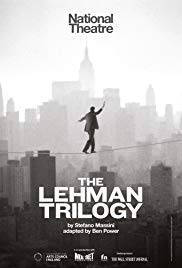
THE LEHMAN TRILOGY
UK, 2019, 180 minutes, Colour.
Simon Russell Beale, Ben Miles, Adam Godley.
Directed by Sam Mendes.
This is a film and photographed version of the stage production, from the prestigious National Theatre Live. It is one of the best productions and transference of theatre to film. While it is a play, it is more an experience of storytelling.
The running time is three hours, divided into three acts. The action covers 160 years, the history of Lehman Brothers, the migrants from Rampi in Bavaria, two brothers arriving in the 1830s, the older, Henry, arriving in New York, the second brother, Emanuel, arriving in Baltimore and the two brothers setting up a fabric store in Montgomery, Alabama, where they are joined by the third brother.
The first act is entitled The Three Brothers. The second act moves on to children and grandchildren, culminating in the collapse of the stock exchange in 1929. The third act is called The Immortal, an ironic title for the history of Lehman Brothers, the company eventually being taken over at the end of the 20th century by others – and then, its final collapse in 2008.
The staging is striking and intriguing. There is a large revolving platform, the structure of the room and space with some glass walls and open area. The cast is able to make its way around the vast space as well as move outside it when necessary. In the space there are many boxes which can be used for various purposes illustrating stock, money, as well as building blocks on which the actors may sit, stand, climb. The atmosphere comes from background rear projection, a range of visual effects to illustrate Montgomery Alabama, the cotton fields and fires, New York City, Wall Street, the 20th century crowding in on the Lehman Brothers’ offices.
This indicates that the play, derived from a nine hour radio program by an Italian poet, Stefano Massini, translated and adapted for the stage by Ben Power, is an overview of the growth of American capitalism from the 19th century to the beginning of the 21st-century, a history of business, the shift into brokerage, agencies for products and industries, the formation of a bank, the management of money, the exploitation of money… from shops and shopfronts to city offices to the history of Wall Street and the American stock exchange.
While the technical aspects are so striking, along with a single pianist playing a range of mood music accompaniments for each era, it is the language and performance that hold the audiences, at times, spellbound. There are three actors who begin as the three Lehman brothers but then move on to a whole range of characters, family descendants, but also incidental characters in Alabama, in New York, with family, including female and children characters. There are no changes of costume, the actors simply indicating the change of character by posture, action, voice change, intonations and modulations.
It also means that a lot of the dialogue of the play is, in fact, the characters describing what they are doing and why they are doing it as well as the effect on them. On paper, this might be a device that would be argued against, but it does provide a wonderfully dramatic blend of word and action.
But the first and the final words of acclaim have to be for the three performers, three men with great credits in English theatre, film and television. Here, they are at their best, eliciting audience admiration for their memory capacity for performing during the three hours, the accuracy of their portrayals, the perfect timing as they interact. And, their voices and articulation draw the audience in even as they describe the actions and perform them.
The three actors are Simon Russell Beale, Adam Godley, Ben Miles. Audiences will have seen them in a range of roles on stage and screen, and small screen. Much of their presentation could be described as performance rather than acting but in creating great variety of characters, they rely on the techniques of acting, instantly creating characters, communicating feelings, communicating ideas.
And, direction is by veteran stage director an Academy award winning film director (for American Beauty), Sam Mendes.
Published in Movie Reviews
Published in
Movie Reviews
Saturday, 09 October 2021 12:59
Nightingale, The/ 2018
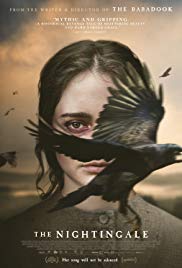
THE NIGHTINGALE
Australia, 2018, 135 minutes, Colour.
Aisling Franciosi, Sam Claflin, Baykali Ganambarr, Damon Herriman, Ewen Leslie, Harry Greenwood, Charlie Shotwell, Charlie Jampijinpa Brown, Michael Sheasby.
Directed by Jennifer Kent.
This is one of Australia’s most powerful films. It is a dark drama – and, quite demanding to watch. But it offers an invitation to go into the depths of human experience in Australia, an exploration of what Hobbs called “man’s inhumanity to man� and, especially in this drama, more literally man’s inhumanity to woman.
The writer-director, initially actress, Jennifer Kent, made quite an impact in 2014 with her imaginative horror story, The Babadook. Here she goes into Van Diemen’s Land, 1825 – a rather unrelenting visit to a time that few in the film’s audience might want to have lived through.
The title is initially beguiling, Claire, a young convict from Ireland who has served her term has been married to an Irishman and has borne a baby. She is still waiting for the documents for her release. We see her doing all kinds of menial work, hard taskmasters and mistresses, and singing in the local tavern, the British lieutenant being her greatest admirer. But, small birds can easily be caught and destroyed – and, the audience has to share Claire’s dire fate.
Most Australians don’t go back into the history of the continent from the time of Captain Cook and his declaration that the land belonged to know one, was ‘terra nullius’ with the judgement that the inhabitants of the land were less than human. There was no knowledge then that the aboriginal peoples had lived and thrived here for more than 60,000 years.
And this is the context for Claire’s story, Claire, somewhat shockingly, being as dismissive of the aborigines as everyone else – but, dire circumstances, the brutal vengeful attitude of the exploitative lieutenant wanting to destroy Claire, harden the young woman in her suffering and she herself becoming more and more obsessed with vengeance. As the lieutenant makes a journey through the bush from the dead-end convict settlement he is in charge of to Launceston, she employs a young aboriginal man, educated in white ways and language, devoted to his people, to country, his symbolic bird being the Blackbird. They track the expedition to Launceston, a toll-taking journey, violent episodes along the way.
Most audiences will not have seen Aisling Franciosi, an Irish-Italian? actress, put-upon convict becoming fierce pursuer of the arrogant lieutenant (played by British actor Sam Claflin) and his brutal orderly, Ruse (Damon Herriman). The aboriginal young man, Billy, is played by theatre performer, Baykalli Ganambarr. Each is completely convincing in their performance.
Van Diemen’s Land is shown with its harsh terrain, heavy bush, high mountains, swollen rivers, the beginnings of roads through the bush. The convict settlement seems unrelentingly harsh. The glimpses of Launceston indicate the beginnings of transition from settlement to what the whitecomers to the land describe as ‘civilisation’.
Colonial Australia at the beginning of the 19th century is marked by British superiority, to the Irish but, with unwarranted self-assertion, violently hostile to the black population, few scruples in exercising violence towards the men, sexual exploitation and rape towards the women.
This is the kind of film that asks its local audiences, wherever they have come from, prisoners and settlers in the 19th century, migrants and refugees in the 20th century… to acknowledge that our origins have been truly violent, a heritage of massacre, exploitation. And, as we watch this film in the 21st century, we remember that there can be change, with acknowledgement, repentance, an inherited need for honesty and atonement.
While this review has comments on the social impact of The Nightingale, critics will also praise the strength of the writing, the intensity of the direction, the passion of the performances.
1. The director and her reputation? Expectations? The Australian setting, the 19th century, Van Diemen’s land and Australian history? The aborigines and their fate? The colonial superiority? And convicts
2. The title, the term, sweet and singing? Symbol? For Claire? But the reality of her experience? The symbol of the Blackbird? Billy and the Blackbird?
3. 1825, costumes and decor, the harshness of the terrain, of the settlements, the bush, rugged, the colonial town, houses and streets, taverns and offices? The film creating the atmosphere? The musical score?
4. The history Australia, Van Diemen’s land, the convict settlement, harsh life, the prison atmosphere, the harshness of the authorities, the colonial superiority, exercise of violence, newcomers and the attempts at obliterating the original inhabitants of the land? Brutality in the attempts to “civilize�?
5. The dramatisation of race issues, the early 19th century, the attitude of the British, the empty land, the lesser dignity and humanity of the aborigines? Colonialism? The film and the perspective of 21st-century filmmakers, the assessment, treatment of aborigines, violence, rapes and massacres, superiority – and the 19th century extinction of aborigines in Tasmania?
6. “Man’s inhumanity to man�? Interactions, treatment, realism, brutality, violation? And the explicit treatment of this on screen?
7. The introduction to Claire, from Ireland, her age, convict, her crimes, to Van Diemen’s Land, her freedom but the Lieutenant not giving her the documents, her work as a maid, the menial tasks, her relationship with her husband, love her baby? At the tavern? Her singing? The response of the Lieutenant, the sexual encounter, attack, abuse? His despising her? Her character, her plight?
8. The Lieutenant, British, his character, age, arrogance, expecting promotion, his criticism of the officer, the interview with him, the officer not supportive of him? His treatment of his men, especially Ruse? Power, authority, sexual domination, and murders?
9. Ruse as a character, his abruptness while reviewing the men, his authority over them, subservient to the Lieutenant? The other officer and the visit to Claire and her husband?
10. The crisis, Aidan and his wanting to defend his wife, her trying to calm him down, the interactions in the house, the challenge, defying Lieutenant, his death? The baby, its crying, its being killed? Claire and her weeping, her being bashed?
11. The Lieutenant and his entourage, going to Launceston for the promotion? Uncle Charlie and his guidance? The convict group, the boy, the Lieutenant and his motivations?
12. Claire, the experience of the violation, the deaths, her grief for her baby? The changing to revenge, becoming more obsessed and determined, the dreams and her being haunted?
13. The encounter with Billy, his background, his tribe decimated? His age, in himself, his education? His sense of country? Skill in languages? His attitudes and skills? The symbol of the Blackbird? A genial personality? Claire and her superior colonial attitude towards him? The eventual discussion about the link between the Irish and the aborigines and their being oppressed?
14. The journey, Billy and his skills, Claire and her determination, going to the river, her being rescued? The physical difficulties, the danger, the need for firm food, Claire with the gun, the time taken for the journey, to catch up with the expedition, walking and riding, camping, eating the insects, the later hunting of the wallaby with Billy’s carving the spear?
15. The Lieutenant, his journey, treatment of the convicts, treatment of uncle Charlie? Ruse and the convicts? The boy, the Lieutenant teaching him about the gun? Uncle Charlie leading them to the wilderness? The Lieutenant killing him? The episode with the aboriginal woman, her baby, Ruse and the rape, the Lieutenant and the rape? The men coming to rescue her, the confrontation, their being shot, the woman killed?
16. Billy and Claire, the Lieutenant seeing them, Billy and his being spared so that he would lead them to Launceston, the boy unwilling to shoot, the Lieutenant killing him? A confrontation with the flare?
17. Claire and her revenge on the soldier, catching up, his running, her pursuit, his pleading, her shooting him, the death?
18. Claire confronting the Lieutenant, not able to kill him, her dreams? Going into the water? Surviving, the decision to go to the town? Billy leading the group, saving them, his hiding, Claire intervening?
19. Claire going to the tavern, the Lieutenant in the group, the captain? Claire publicly defying him, her explanations and taunts, the reaction of the captain? Her singing – and destroying the Lieutenant? Ultimately his death? Billy and his role?
20. Claire and Billy leaving?
21. The audience sharing the journey, immersed in the harsh colonialism, arrogant superiority, the persecution of the aborigines?
22. The film dramatising the past, no holds barred, the impact for the 21st-century audience and the need to see and understand the harshness of the past?
Published in Movie Reviews
Published in
Movie Reviews
Saturday, 09 October 2021 12:59
Sextuplets
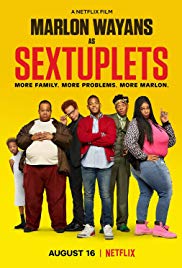
SEXTUPLETS
US, 2019, 97 minutes, Colour.
Marlon Wayans, Bresha Webb, Michael Ian Black, Glynn Turman, Debbie Morgan, Molly Shannon.
Directed by Michael Tiddes.
The Wayans family have contributed a great deal to American entertainment, especially spoofs and satire is, over many decades. While their appeal is initially to an African-American? audience, they have quite a broader following in the United States as well is overseas.
Marlon Wayans has stood out for the number of feature films he has participated in, send ups of the Screen franchise with a range of Scary Movies, parodies of other genres, including the 50 Shades erotica.
He has a very loyal following – but many audiences have found his fairly unsophisticated and broad humour, and sometimes questionable taste, not to their liking. He is not high on critics rankings of comedians and comic filmmakers.
This is probably the same with sex templates – although it does give Marlon Wayans the opportunity to portray the six grown-up children as well is their mother! Interestingly, the central sex template, Alan, seems a fairly normal person plunged into a whole lot of complicated and sometimes absurd situations. (A variation on this theme is his Robert, but will immediately acceptable, in Naked.)
Here Alan is happily married, his wife about to give birth. He wants to know something about his birth family and persuades his father-in-law, a judge, Glynn Turman, to getting the information which he does rather instantly. The shock is that he has five brothers and sisters and then goes in pursuit of them.
He has the opportunity to do a brother who eats too many sweets and has lived with their mother, a fat suited sometimes bumbling character. Another brother is a conman variation on Alan who intrudes into the family, especially to Alan’s wife. There is a very your brother, diminutive, and Alan finds himself trapped into contributing a kidney – with the invalid jetting off to Cuba to raise money for his health and medication. Another brother is rather prissy and actually works as a secret agent. Along with all of these is a very large sister who is spent some time in prison and, literally, throws her weight around. And, finally there is his mother who seems a variation on Loretta Devine (who was his mother in Naked).
Lots and lots of slapstick. Lots of pressurised situations on Alan and his being forced to go to places he wants to avoid. Caricatures of the other sextuplets.
So, probably only for those who are Marlon Wayans’ fans.
An IMDb quote:
Look, I want to be able to make the stupidest movies ever, because they make people laugh and they make money. But that's not all I want to do. And I think I've proven to some people — the ones paying attention — that I can do more. Everybody else, well, they can wait and see and make up their mind.
Published in Movie Reviews
Published in
Movie Reviews